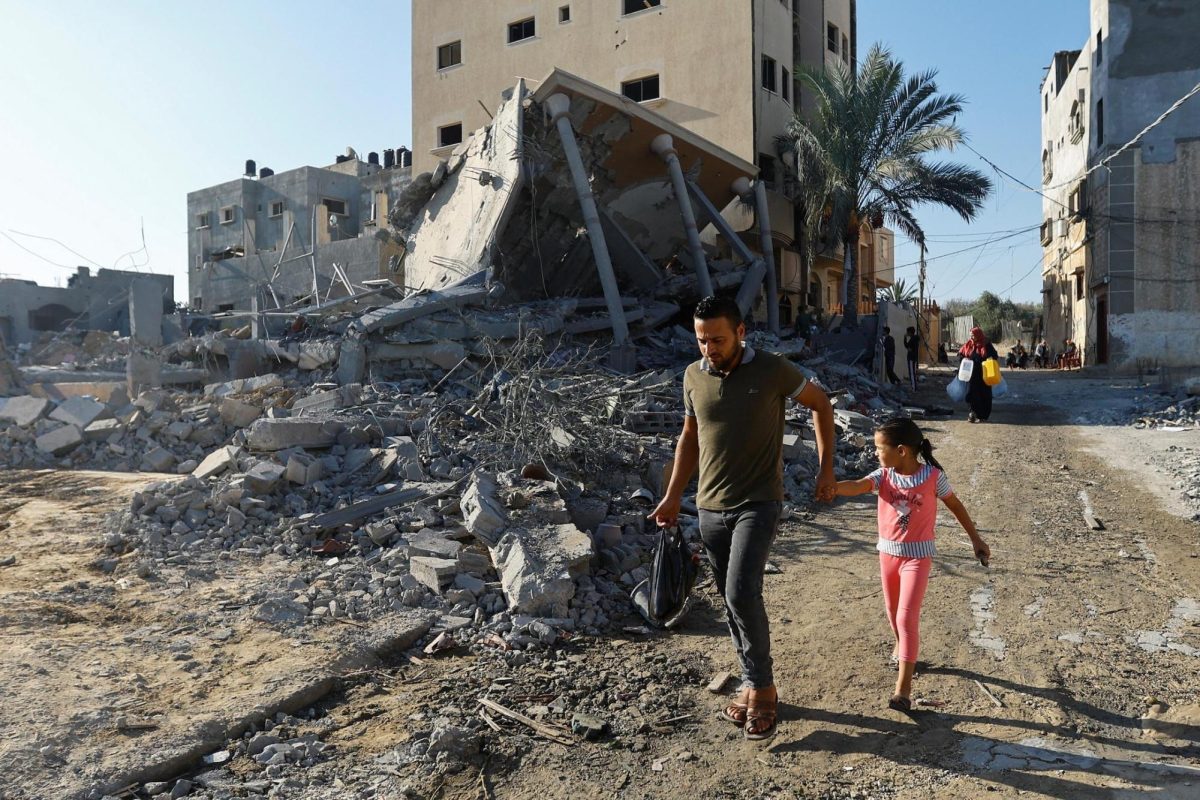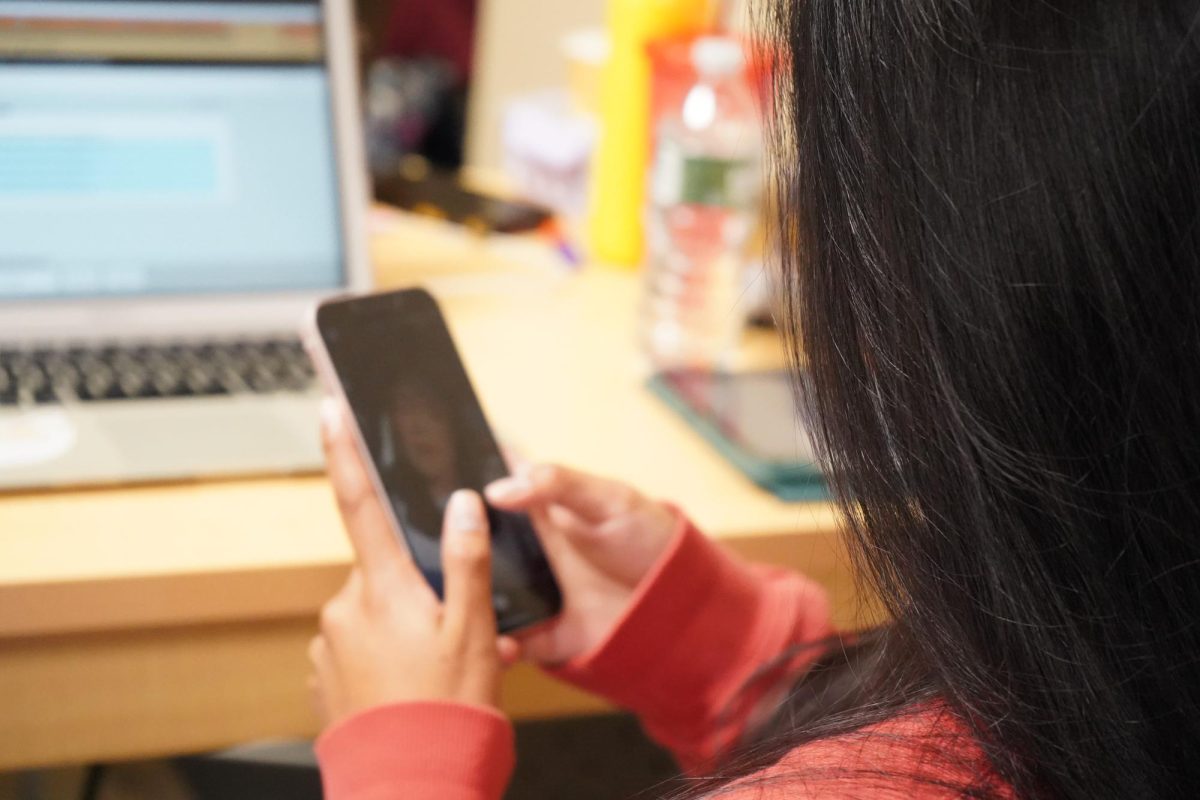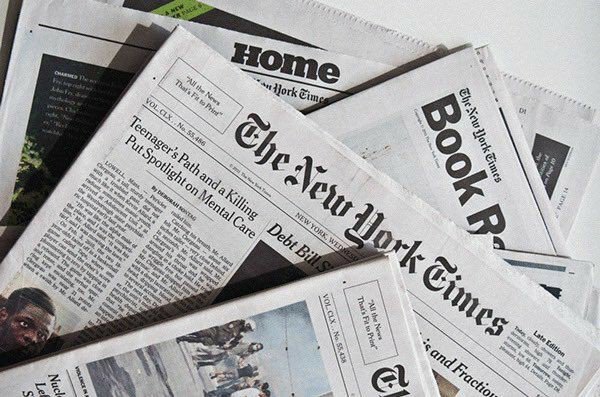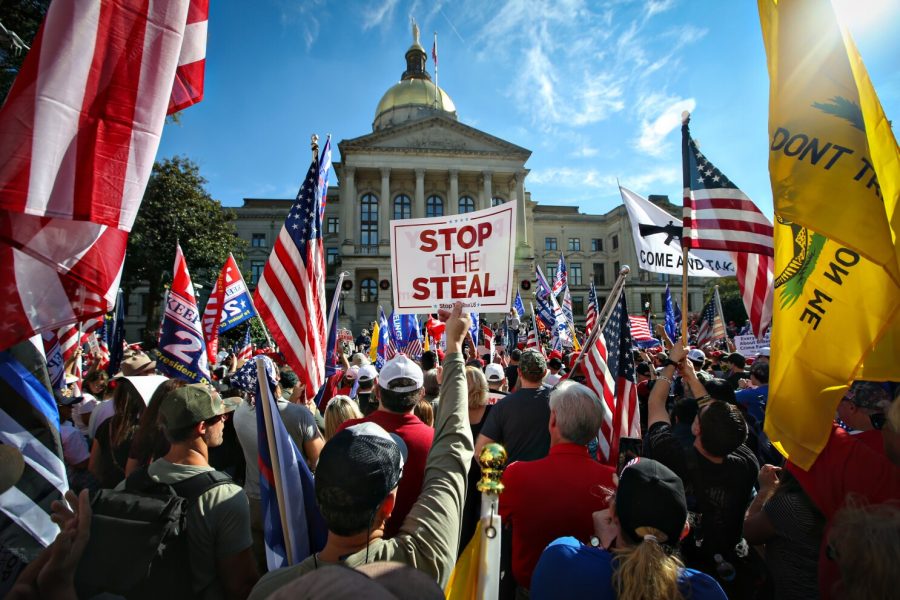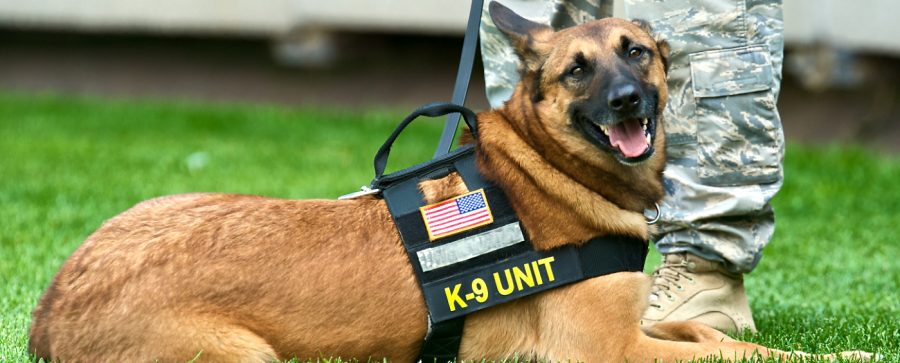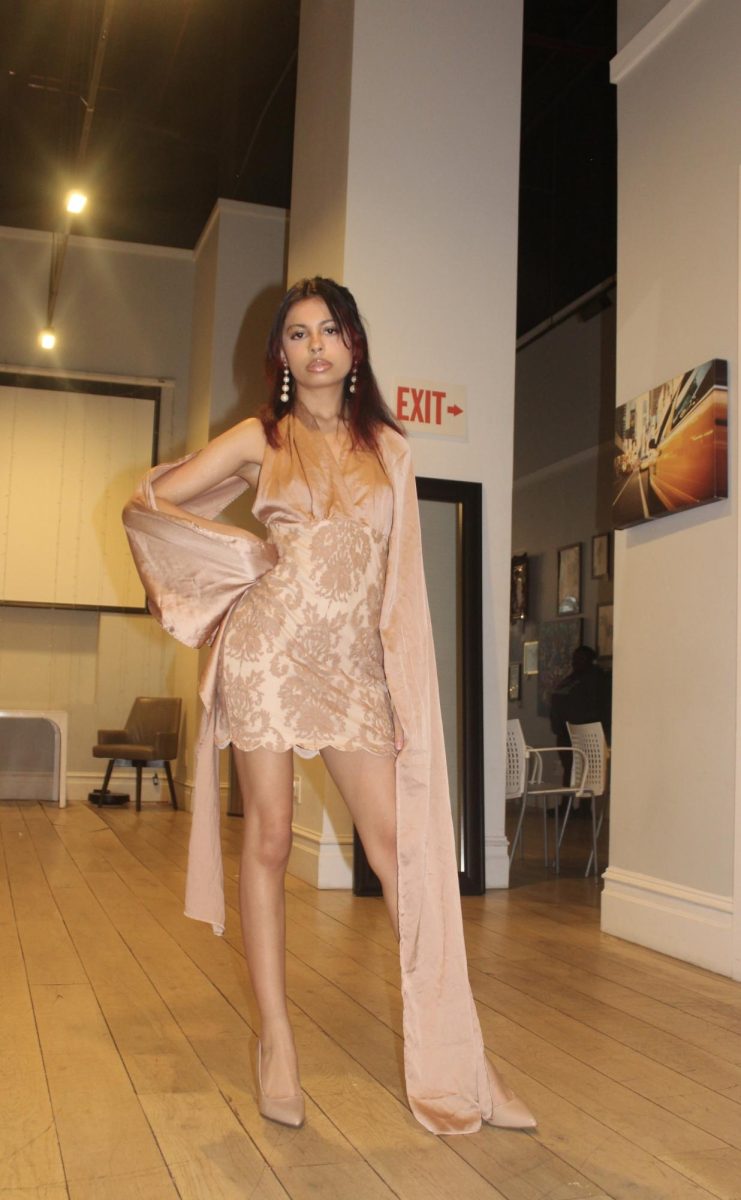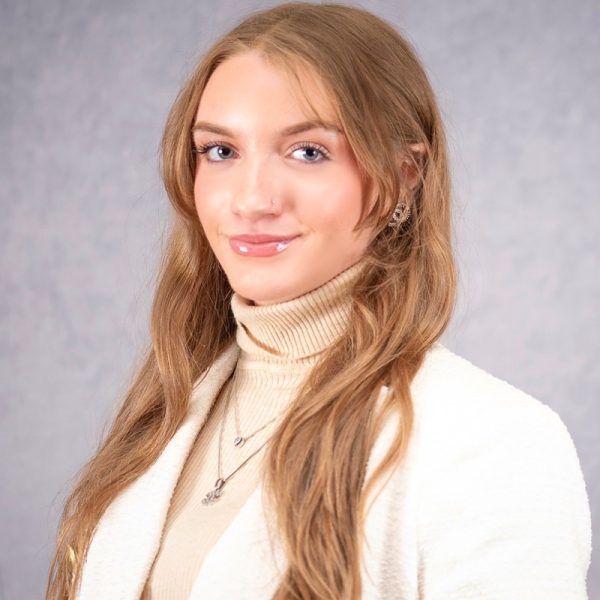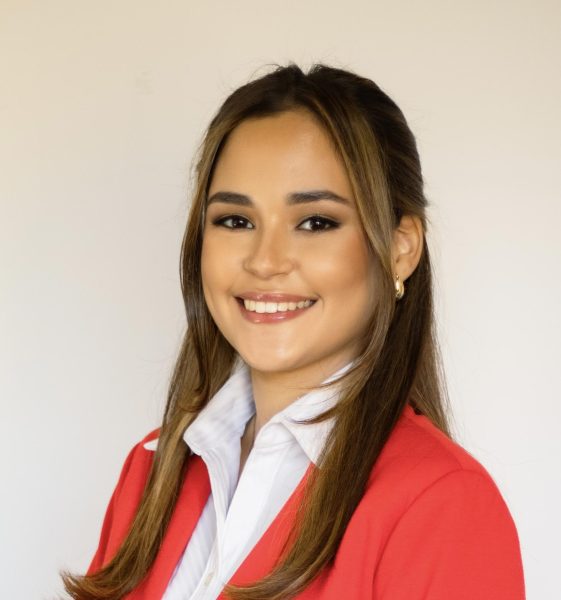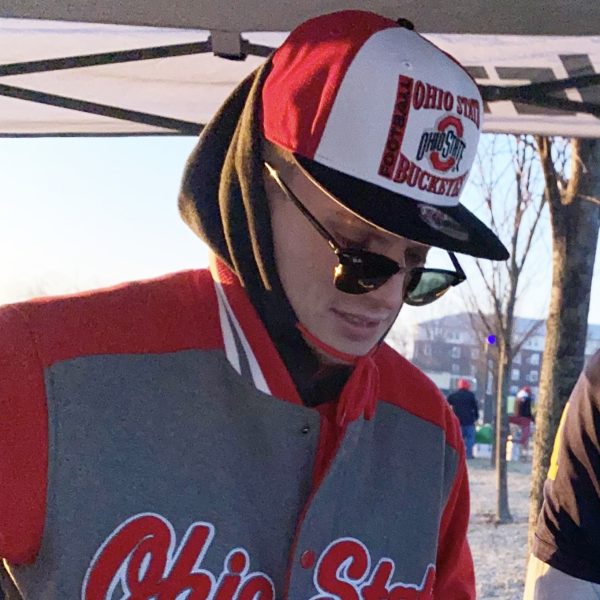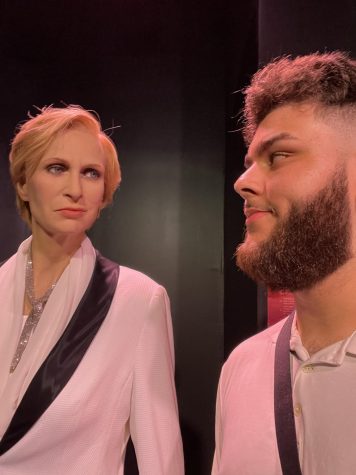She sat on the train on her way home from Long Island, New York back to her college campus.
It was just like any other dull train ride to school until she saw a woman handing out crisp flyers that said, “Palestine is killing our people in Israel!”
Chashman Khan, a Muslim, is a sophomore Mercy student studying nursing. The woman approached her in her seat with a sharp look, and asked her what side she supported.
Khan froze. She didn’t know how to react. Simply put, she was startled.
“I felt scared.”
Khan acknowledges her experiences as a Muslim female is different than most. “It’s funny growing up in a modernized world in a Western society as a Muslim girl. It’s funny that anything around the world, especially in a Muslim nation like Palestine, that happens can directly affect you, even if it’s around the world.”
The events in the Middle East have affected the lives of Americans, whether they have loved ones there or not. Yet for those who have connections to the region, whether by blood or faith, the realities of the most recent war in the Middle East have begun to seep into their everyday life.
Jewish Student and Mercy University athlete, Ryan Resnick, pondered the concept of picturing himself holding a gun and fighting in this conflict. He paused.
“I absolutely cannot.” He continued, “I have these friends over in Israel, and my biggest worry in the world right now is finals and papers and lacrosse.”
Khan also is concerned for his Palestinian friend’s family in the Middle East. “A lot of his family lives in Gaza, and he came up to me the other day. I asked how he was doing, and he told me he was not good, and that this week alone he’s lost 12 family members.”
At least 20,000 people so far have been killed during the Israel and Palestine conflict since October. The number of casualties, and the description of the region, seem to escalate by the day.
Muslim student Q Morales is distraught by all of the violence she has seen on the internet and has a hard time seeing it end soon. She said, “There will be a lot of bloodshed for sure…It’s a constant battle of children.”
Despite opposing religions and viewpoints, can unity in diversity form among students in contrast to the adult leaders of Israel and Palestine?
Khan added, “I’ve written essays about Palestine and the Israeli conflict and I’ve seen both sides of it. And you know, I keep saying (my perspective) as a Muslim girl but honestly, I would have acted the same way if the roles were reversed…if what’s happening in Palestine was happening in Israel, I would have been the biggest advocate for Israel like I am for Palestine.”
Muslim Mercy student Youssef Atif said, “I talk about it regularly with my friends. So, the conflict is not about you being a Muslim and I am Jewish. You’re a human and I’m a human, and what is happening right now is not human. That’s the conflict we all wish to stop. Even Jewish people wish that to stop.”
Atif’s friend and Jewish Mercy student Eric Sleavensky shared a French class together. Despite their opposing religions, the two talk about video games, soccer, and sometimes about the Israel and Palestine conflict.
However, Sleavensky said, “We don’t let it consume us.”
For students like Atif and Sleavensky who may not have friends like that to turn to, finding resources to talk to can be important in a time where peace and calm are distant.
Muslim Mercy student Mohamed Magassa has found resources within Mercy University campus life and says she is lucky to have a lot of options to turn to for help.
“I’m in the Mercy Muslim Student Association, so I have a lot of Muslim friends to talk to about it. My Palestine friend, obviously. Even outside of here, there’s a couple of Muslims that I know that I speak to about it so I have a good amount of outlets…”
However, in terms of school authority, he said, “I’m not expecting Mercy to do much because at the end of the day, when you deal with subjects like this, it’s very touchy. I understand the college being neutral because once you take a side, people become upset. I’m not sure what else they can do besides something like this (The Impact interview) – giving the students a place to speak.”
The Timeline
Oct. 7, 2023: Hamas launched a surprise bombing on Israel, killing over 250 people while injuring another 1,500 in the explosion. Hundreds of Israeli citizens who weren’t killed in the attack were stolen as hostages and taken back to Gaza.
Mohammed Deif, the Hamas’ military commander, claims they initiated the attack because of Israel’s drawn-out blockade of Gaza.
Oct. 13, 2023: Israel’s military directs over a million Gaza City citizens to vacate and flee southward. The residents are ordered to depart to Rafeh, though the city is facing its own societal threats.
Oct. 17, 2023: Gaza City hospital, al-Ahli al-Arabi Baptist, suffers a mysterious explosion that results in nearly 500 deaths. The Palestinians accuse the Israeli of an air raid, but Israel responds blaming the attack on a rocket launch misfire by the Palestinians.
Oct. 27, 2023: Israel’s chief of military announces that the Israeli armed forces will continue to expand their way into Gaza, insinuating another organized ambush was soon to follow.
Oct. 31, 2023: As Israeli forces announce the second phase of the war, they deploy an airstrike on a Gaza refugee camp, injuring about 150 and killing approximately 50 people, including a Hamas commander.
Nov. 8, 2023: Over 10,000 people have been declared dead in Palestine and an additional 1,400 in Israel. More than 240 Israelis remain confined in Gaza.
Nov. 13, 2023: Israeli tanks invade Gaza City hospital, Al Shifa, with the belief that there’s an underground Hamas military headquarters constructed underneath the hospital, which the Hamas denied.
Nov. 15, 2023: Israeli armed forces enter Al Shifa hospital and investigate the facilities. They stumble across a few weapons and the entrance to a tunnel leading to a spacious hidden section.
Nov. 21, 2023: Hamas and Israel declare a pause in the war, allowing medical aid to recuperate the people of Gaza.
Health authorities report that 14,000 Gazans were killed, with 40 percent representing children.
Dec. 1, 2023: The conversation of an extended truce abruptly concluded, as Israeli military planes sent an attack on Gaza, resulting in a large sum of people being killed and the survivors forced to escape.
During the truce period, Palestine released 240 detainees in return for 105 hostages in Hamas. But Hamas still holds 130 male Israeli citizens after failing to meet the agreement terms.
From Tweets to Truth: Media Portrayal
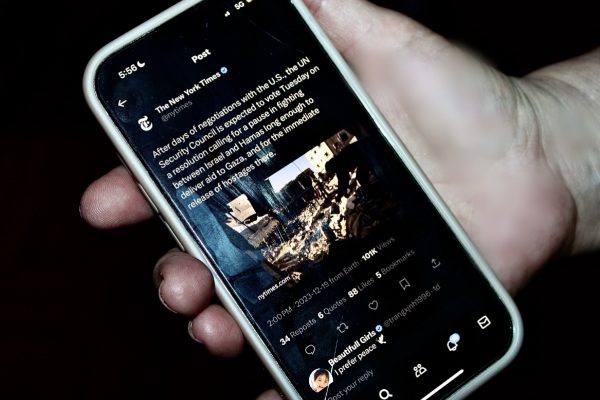
With more and more people killed every day and their homes destroyed, observing and reporting news in the Middle East can be harder to accomplish with such accuracy and speed. News outlets, like The NY Times, Reuters, and The Associated Press, have faced backlash due to their determination to cover the conflict leading to deceptions that “relied too heavily on claims,” according to The Times.
Even bloody-looking protests against The New York Times transpired.
Thousands marching across Manhattan in solidarity with Palestine made a stop at @nytimes to call them out for their complicity with the Zionist state of Israel, which has already killed over 11K people and displaced over a 1M in Gaza. pic.twitter.com/IZ01xkS4Kz
— Luigi W Morris (@LuigiWMorris) November 11, 2023
However, nearly 20,000 have been killed in the Israel-Hamas War and coverage is unavoidable.
Junior Mohamed Magassa is an exercise science major and a Muslim, who attends Mercy. He says technology has changed how people see social topics.
“In today’s age, with so much media available, it’s a blessing and a curse. Because I get to see a lot but I don’t know if the sources are being truthful. You have to do a lot of digging.”
Magassa continued, “The blessing is I’ve been able to learn and see. There’s a bunch of journalists documenting what’s going on but I also have to keep in mind people have their agendas. People have their biases.”
Students seemed to be highly skeptical of truth in the media for a similar reason. Money.
Youssef Atifm is studying business administration and entrepreneurship and is also a Muslim at Mercy. He said, “The media doesn’t control itself. The media is controlled.”
Sophomore Q Morales, a psychology major, added, “I feel like a lot of the media is biased especially if you dive into who’s supporting this media and who’s paying for production..it will tie back to Israel in some sort of way because the U.S. supports Israel.”
Junior Ryan Resnick, an education major at Mercy who is Jewish, said, “Everyone says there’s one side to the story, there’s the other, and then there’s the truth. There’s going to be skewed things and fake news on both sides of everything. It’s just like having an open mind and looking at everything and getting multiple perspectives.”
However, regarding the truth, Magassa added, “You know one thing you can’t lie about is the videos. When you see children dead, children’s parents holding their dead children in their hands, you can’t lie about that. I’ve never seen so many dead children in a week. I’ve never seen something like that before. I’m almost becoming desensitized to it which is kinda scary.”
With so many different outlets covering the conflict in both publications and social media, audiences becoming used to viewing disturbing videos or drifting away from daily used platforms can become a reality.
Morales used to spend her time on social media not looking at the news, but that has changed. Initially, she was sad, but it turned her angry.
“I honestly had to take a little bit of a break from it…It took all the courage in me to just pull myself away from that because the way I feel about it is I have a privilege. I have a voice, I can use that voice, I’m breathing today, I have food in my belly, I have a roof over my head, I have fresh water to drink – not a lot of people have that luxury.”
What once has been seen as a leisure activity for entertainment has now seemed to have transformed into a favorite source for all things news.
Chashman Khan is a Muslim and nursing student at Mercy. The sophomore said, “I have definitely been on social media more because I think social media has been one of my biggest educators…I feel like it’s so enlightening. It’s shifted from that [Hollywood world] to being smart that I learn and can be self-aware and be aware of what’s going in the world.”
Magassa said it’s hard for him to enjoy because of the visuals he knows he is going to see. “I don’t want to see some images but also I don’t ignore it because it’s happening.”
And because it’s happening to people he may know, he knows he can’t ignore it.
“I repost a lot of the content because I want other people to see it too so it does take away the humorous side of social media.”
Atif added when he opens his social media, “I cry every single time. Especially when I see a video about kids.”
Spreading views on the conflict and reposting videos has even led to a loss of connection and friendships between the closest of people. Khan said, “A lot of my closest friends from 8th grade unfollowed me because I posted about Palestine and it makes me feel kind of reserved about sharing my opinion publicly.”
However, Resnick acknowledged this idea of differing viewpoints on social media.
“I’m not going to lose friendships over this. It’s just not the person who I am.”
Uniting Israelis and Palestinians for Peace
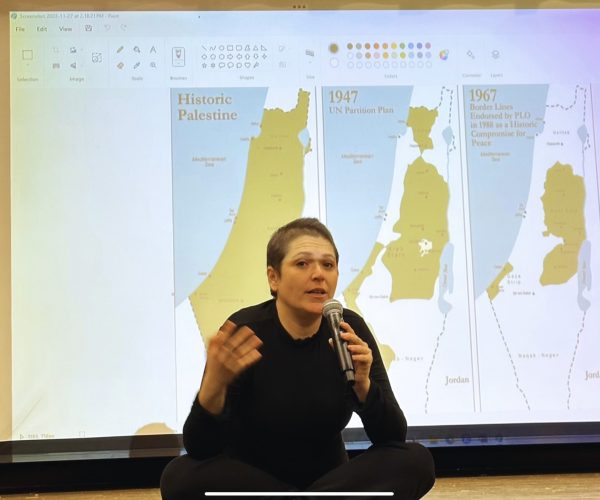
Beth Schuman, a heart-motivated long-time activist, spoke to Mercy’s community about the longstanding humanitarian crisis between Israel and Palestine in December in Dobbs Ferry.
To comprehend the complexity of the Israeli-Palestinian conflict, students must delve into its historical, religious, and political roots that span thousands of years. The dispute essentially involves competing national and territorial claims between Israelis and Palestinians.
In advocating for peacemaking, Schuman emphasizes the importance of accepting diverse opinions. Raised in “a very right-wing Israeli Family,” she sought to broaden her perspective, challenging preconceived notions. Schuman’s journey unveiled the existence of another narrative contrary to her initial Zionist education.
She has proudly tried to show her mother the other side of the narrative she was taught.
The Zionist movement gained momentum in the late 19th century, seeking to establish a national homeland for Jewish people after the Balfour Declaration in 1917, where the British government expressed support for establishing a “ national home for the Jewish people” in Palestine.
Two pivotal moments post-World Wars significantly escalated tensions. After World War I, the League of Nations granted Britain the power to administer Palestine, dividing the land and intensifying friction.
Post-World War II witnessed increased immigration and global sympathy for Jewish refugees and the Zionist cause.
In 1947, the United Nations proposed a partition plan to divide Palestine into separate Jewish and Arab states.
International efforts to resolve territorial and refugee issues persist, entangled in historical grievances, competing national aspirations, and complex geopolitical factors.
Schumae was told that movements such as J Street were considered antisemitic. J Street is a non-profit organization founded in April 2008, and its primary goal is to end the conflict between Israelis and Palestinians in a pacific and diplomatic way.
Schuman says, “While I was raised, I had a right hard narrative; it wouldn’t have ever occurred to me that there was another narrative.”
She highlights the tragic cycle perpetuated by the conflict, where children born into it often become casualties, driven towards extremist ideologies. Schuman shares a personal account of a friend, a Palestinian, who lost family members in an unfortunate event, altering their relationship due to the conflict’s impact.
“While in New York, I had a close friend who was Palestinian. Her brother, her best friend, and her kids were killed while they were waiting in a hot area where Israelis shot them. They all died, and suddenly, my friend was not my friend anymore.”
This causes passionate people to feel sympathy for terrorist groups such as Hamas, she says.
Schuman’s exposure to the other side unfolded during college, fostering a deep friendship with the only Palestinian student on campus.
Schuman says, “We were fast friends; we would set up weekly meetings to discuss what we were taught.”
This exchange of narratives left her astonished, prompting a profound reevaluation. The epiphany deepened during her 2005 trip to Israel, coinciding with the disengagement plan or “Gaza pullout.”
Schuman adds, “There are different narratives about how the past, present, and future unfold.”
This all took place in 2005. The disengagement plan, also known as the “Gaza pullout” or “ hitnatkut,” was implemented by the Israeli government and led by Prime Minister Ariel Sharon. It involved the evacuation of Israeli Civilians from the Gaza Strip and four settlements in the northern West Bank.
Witnessing “a chain of hands formed by settlers in protest,” Schuman confronted the unsettling presence of racism in the Holy Land. Disconcerted by this atmosphere, she sought solace in India for six years, attempting to distance herself from the conflict.
At the same time, Schuman’s sister was becoming ultra-orthodox while she was in Jerusalem. They were sisters with very different paths going on in their lives.
She returned to the United States for her master’s degree while studying. Her professor introduced her to the film “Disturbing the Peace,” a 2016 documentary film about former enemy combatants from Israel and Palestine soldiers who were tired of the never-ending war and started a nonviolent peace organization.
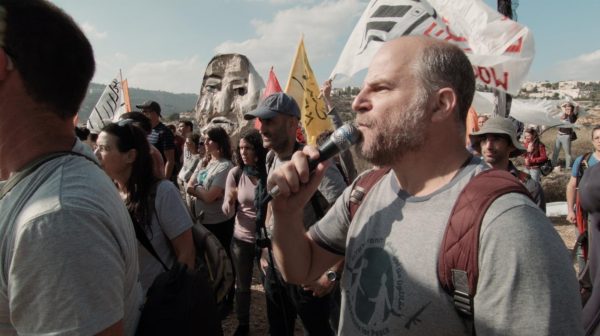
Schuman encountered the individuals featured in the film, and she explained their connection. It served as an eye-opening revelation for her.
She shares a pivotal moment when one of her classmates asked a Palestinian man in the film how he could overcome hate after undergoing torture from the other side for more than 11 years, and he genuinely and profoundly answered bluntly.
He learned how to forgive.
She initiated her involvement with the Peace Organization known as Combatants For Peace, a collaborative movement uniting Israelis and Palestinians with a shared goal of resolving the conflict and fostering peace within both communities. This initiative attracted former combatants from both sides of the active conflict.
Schuman openly recommends watching the film.
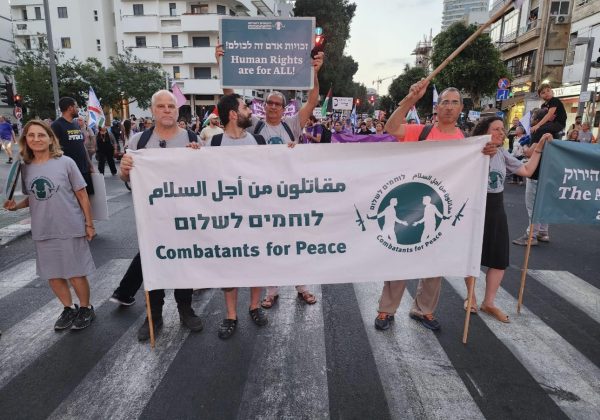
Despite her dedication to peace, Schuman critiques media negligence in covering nonviolent protests, particularly those of Combatants For Peace. The struggles within the peace community, susceptible to infiltration by extremists, remain largely unnoticed.
In her unwavering pursuit of peace, Schuman aligns herself with remarkable survivors who, despite harrowing experiences, advocate for a harmonious resolution.
Schuman concludes by emphasizing the disproportionate impact on children in this conflict, urging a reconsideration of the narratives supported. She challenges the choice between coexistence and destruction, acknowledging the difficulty of promoting peace amidst the turmoil caused by conflicting perspectives.
Schuman says, “Or we figure out how to live with each other or kill each other, which both are possible, but you have to consider which narrative you are going to support.”
The talk serves as a poignant reminder that, tragically, the most innocent—the children—bear the heaviest burden in the quest for lasting peace.
Schuman’s words for young mercy students:
Perhaps it is cliche, but I do believe that peace starts from within. It takes a huge amount of courage to forsake the narratives we are raised with and reach across the aisle to embrace “the other.” This is true not only when it comes to the Israeli-Palestinian conflict, but is true of any conflict – from the interpersonal to the political. To embrace forgiveness instead of hatred and revenge takes true strength and courage. Every single one of us has to make the choice of who we want to be: do we want to perpetuate the narratives of fear and loss, leading to anger and violence? Or do we want to choose to try something new? Of course, this is easier said than done. It takes tremendous empathy, compassion, courage, and fortitude to truly embrace peace, and each other, as true equals. Once we do this – the question then becomes – how do we treat people when we see them as truly equal to ourselves?
Hiding Your Religion: A Surge in NYC Anti-Jewish Hate Crimes
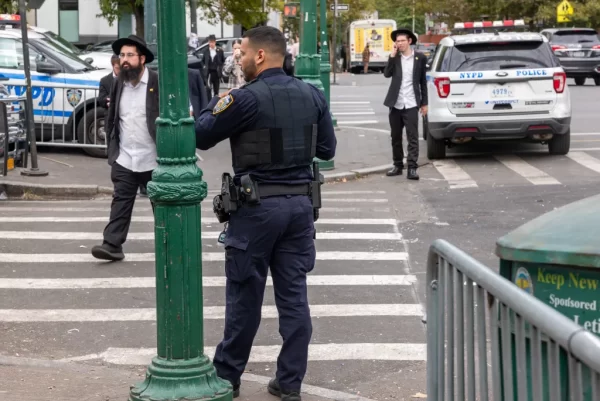
“As long as I keep my religion hush-hush with strangers, I don’t see why it couldn’t be [safe].”
Senior Mercy University student Eric Sleavensky studies music production and audio recording. His mother’s side of the family has roots in eastern European Jewish communities.
He said concerning being Jewish, “Typically when it comes to talking about this with friends and family, they have a more understanding viewpoint. However, -with strangers, you don’t know how they’re going to react.”
He continued that you never know if someone is radical, right or left, or moderate, and that makes their reaction unpredictable.
“ You don’t know if they’re going to react logically or by asking some questions, having decent conversations. Or if they’re going to be emotionally charged and start yelling and ridiculing you or, worst case scenario, try to harm you in some way.”
No credible threats to New York City were previously reported by the NYPD on X on Oct. 12.
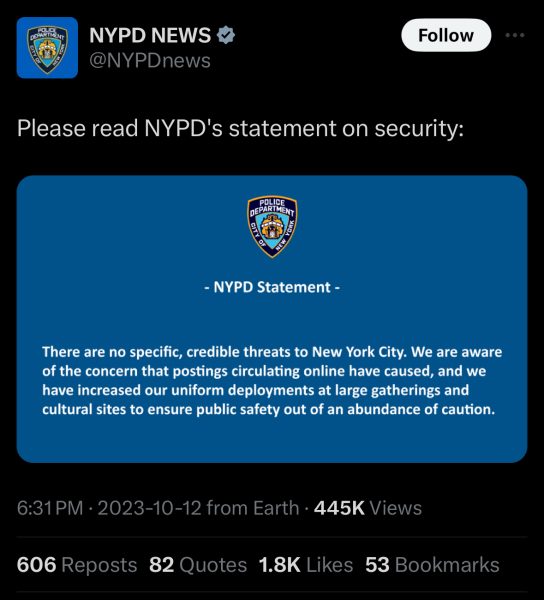
However, less than a month later the surge in anti-Jewish hate crimes has dramatically increased by 124 percent compared to October of 2022. With 101 bias incidents in the city, 69 were directed against Jews, according to the NYPD.
Mercy University’s Student Counseling Center provided a statement to comfort their students and said, “The students at Mercy University represent a diverse body of strong and resilient learners. At a time when grief and loss are causing so much pain and sadness, your hard work, and tenacity amidst the most daunting of circumstances inspire not just your family, but the entire Mercy community to believe that things can get better, and that a brighter future exists for all of us. This future begins with you!”
Compared to last year around this time, the chart demonstrates a significant spike in hate crimes citywide in October 2023. The highest point on the chart is -Sunday, October 29, known on the Jewish calendar as 14 Cheshvan, 5784. A day in the Jewish Calendar rooted in deep history in the Thirty Year’s War. In November of 1620, King Ferdinand II suppressed the rebels in Prague in the Battle of White Mountain notwithstanding the widespread looting, according to the Chabad-Lubavitch Media Center. The king gave orders that no Jew be harmed.
https://twitter.com/i/status/1721613235156066771
After Senator Brad Hoylman witnessed this “unprecedented rise in bias-motivated crimes against Jewish, Muslim, Asian American and LGBTQ people,” he among Manhattan District Attorney Alvin L. Bragg, Jr. and New York State Assemblymember Grace Lee announced the introduction of new state legislation (S7737), the Hate Crimes Modernization Act. This new legislation increases the list of hate crime eligible charges from 66 to 97 to enhance charges and certain sentences.
Hoylam continued, “…it’s of utmost importance that New York closes the dozens of loopholes in our hate crime statute to send the urgent message that hatred won’t be tolerated in our state…With this bill, we can protect New Yorkers of differing backgrounds.”
Flyers have been posted all over the city in a display of the babies, children, women, and men kidnapped by Hamas. Many of the anti-Jewish hate crimes have demonstrated the taking down and bashing of these flyers, as reported by the Jews of the NY community.
The Jews of NY community have shared on X the continuous hate crimes that have been occurring across New York against Jewish people.
The following video demonstrates a woman holding a knife and scraping flyers in the middle of a predominantly Jewish neighborhood in Brooklyn, next door to a Jewish preschool and elementary school.
The @JewsOfNY are experiencing an all time high, 400% increase in Jewish hate.
This deranged looking woman was holding a knife in the middle of a very Jewish neighborhood in Brooklyn, next door to a Jewish preschool and elementary school.
NAME & SHAME
📍 Mill Basin Brooklyn,NY pic.twitter.com/6Iq1Wcw4TQ— Jews_of_NY (@JewsOfNY) November 7, 2023
Others disagree with this as a hate crime as X user @markal84 commented in response, “I see no issue here. She’s removing propaganda.”
Also, in Brooklyn, the NYPD said they have arrested three teenage boys who allegedly attacked three Jewish people on Nov. 25.
Two of the suspects have been charged with three counts of assault as a hate crime and the third suspect has been charged with two counts of assault. Two 14-year-olds and one 13-year-old.
In the theme of New York, Muslim Mercy Student Chashman Khan raised an idea, “But if you think about it, the Gaza Strip has the same population density as New York and if anything that’s happening in the Gaza Strip happened in New York, I feel like the world would literally go insane. So for me, it comes down to the question of what makes New York lives so much more important than the Gaza lives.”
However, Sleavensky speculates that “both Israel and Palestine have skeletons in their closet…I think it’s more political rather than religious.”
He continued, “If leaders could come together and actually set a time for them to meet to set restrictions of some kind so both religions could practice in peace, I believe there could be peace.”
Nurturing Beauty Amidst Middle Eastern Wars
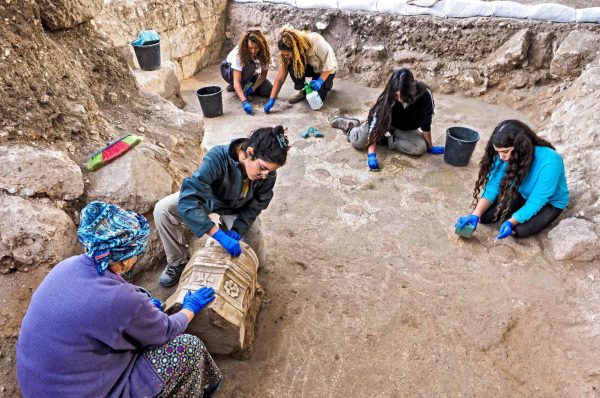
The Holy Land. A land that divided the Mediterranean Sea and the eastern bank of the Jordan River. A land that divided the people of Israel and Palestine.
The land was deemed holy for its belief to be the birthplace of Jesus of Nazareth and the site of his ministry. It consisted of sparkling sites including Jerusalem, the dominating Western Wall, the free-flowing Jordan River, the Mount of Olives, Bethlehem, Masada, and the Dome of the Rock. In addition to ancient towns and the beauty of Gethsemane, the Sea of Galilee, and the Dead Sea. A land created to be the “Promised Land” by God himself.
Yet, multiple wars and a humanitarian crisis have stemmed from the root of such a beautiful holy land, and it cab be considered hard for that beauty to still be found.
The human impulse still yearns to create beauty in their surroundings, despite conflict like the events occurring in Israel and Palestine presently, according to research conducted by interdisciplinary artist and scholar Devora Neumark. This nurturing of beauty can bring a sense of hope and resilience.
A Gaza content producer known as MoTaz on X wrote, “ It’s been almost two months since I came to the beach and watched the sunset. We miss our life.”
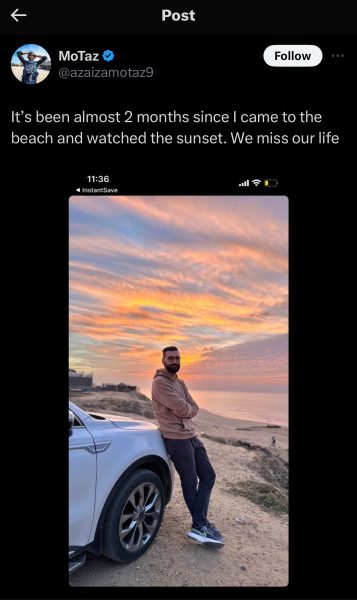
A sunset commonly taken in pictures for its outstanding yet simple beauty. A beauty that occurs at the end of every day made to seem like a rare occurrence with the occurring conflict.
Since the beginning of the conflict in October, over 250,000 Israelis have been displaced and about 70 percent of Gaza’s 2.3 million residents have had to leave or have lost their homes.
Despite where the people suffering may be staying, whether it be in their own homes, shelters, makeshift apartments, or elsewhere, neuroscience demonstrates the brain’s constant desire for beauty and beautifying surroundings. This can include painting, adding pictures or carpets to an area, rearranging furniture, and more.
Neumark’s research studied over 200 individuals who experienced forced displacement and were refugees amid conflict and war. The study found that beautifying their homes seemed to aid the intergenerational trauma caused by the displacement. Beautifying homes in a hopeful attempt for the future. Especially for children.
A physician in Gaza, Dr. Ebraheem Matar posted on Instagram a picture of three children with the caption, “Gaza kids enjoy the sea view during the temporary ceasefire.”
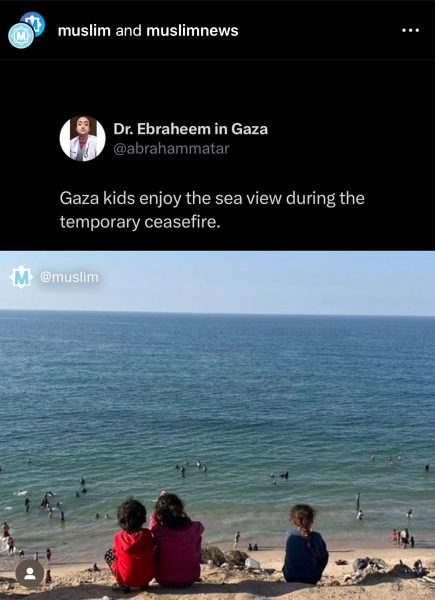
A temporary truce occurred between Israel and Hamas in late November. After quickly ending, more recently on Dec. 19, Israeli President Isaac Herzog said Israel is willing to agree a new temporary truce with Hamas in Gaza to secure the release of more of those captured by the Palestinian group.
Although the wait for another ceasefire on both sides can seem too excruciatingly long, Arabic Proverbs said, “Patience is beautiful.”
A time where beauty is hard to find, but can be used to dream about a future that is.



